Internet as the New Media Socialization Agent for Children
VerifiedAdded on 2022/10/10
|6
|1216
|321
AI Summary
This paper evaluates the influence of internet as a media agent of socialization. It critically analyses three scholarly articles and evaluates their recommendations.
Contribute Materials
Your contribution can guide someone’s learning journey. Share your
documents today.
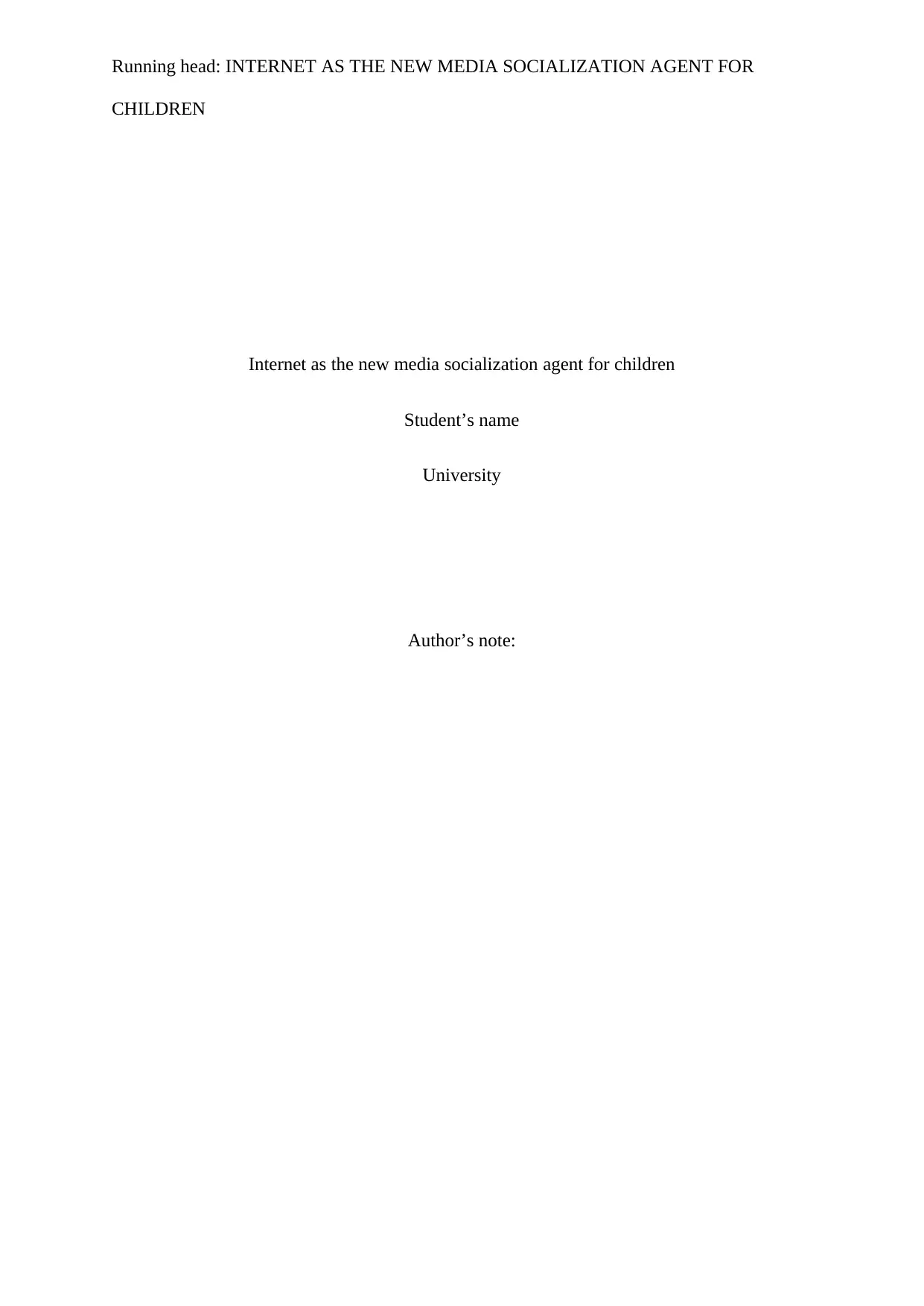
Running head: INTERNET AS THE NEW MEDIA SOCIALIZATION AGENT FOR
CHILDREN
Internet as the new media socialization agent for children
Student’s name
University
Author’s note:
CHILDREN
Internet as the new media socialization agent for children
Student’s name
University
Author’s note:
Secure Best Marks with AI Grader
Need help grading? Try our AI Grader for instant feedback on your assignments.
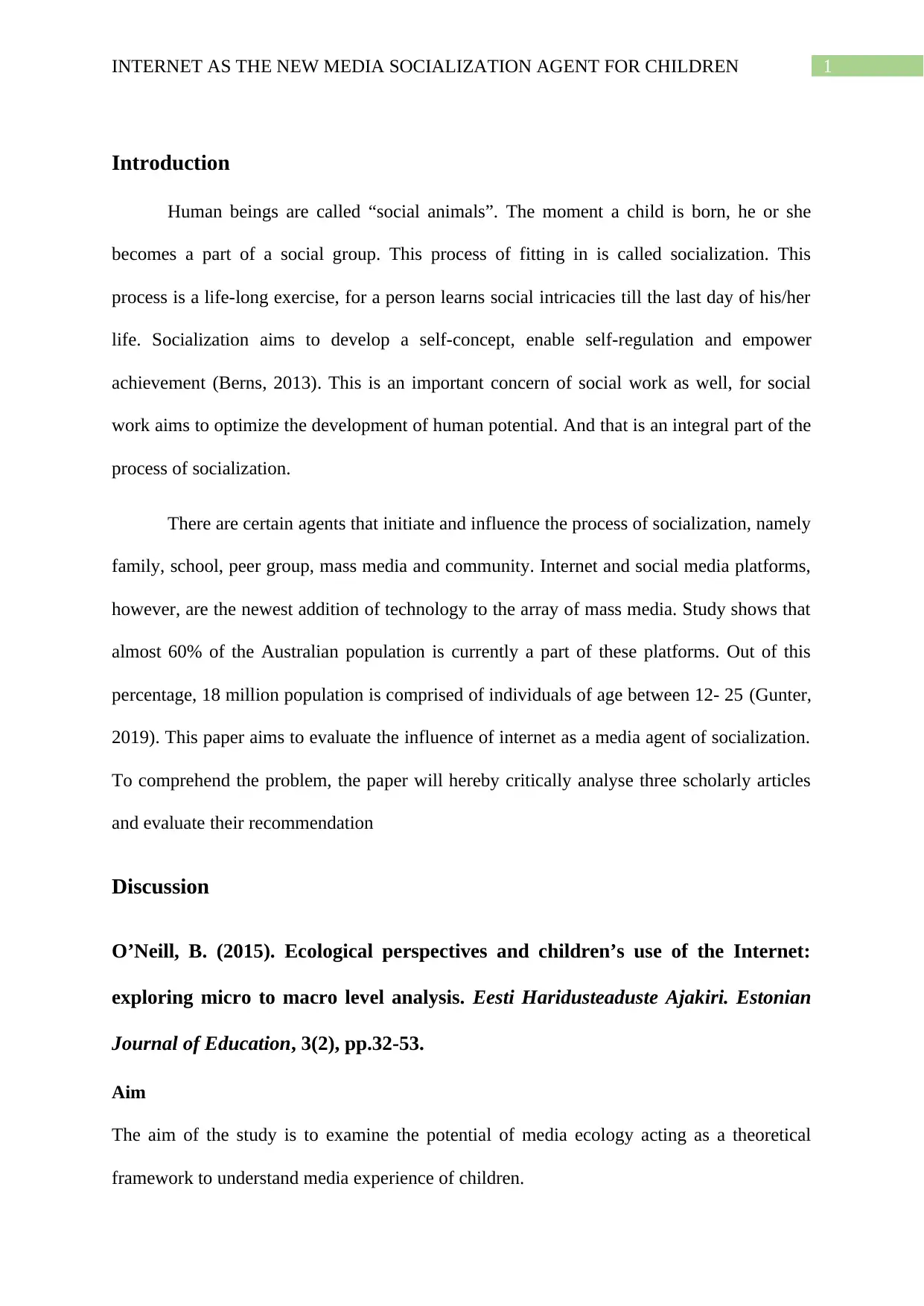
1INTERNET AS THE NEW MEDIA SOCIALIZATION AGENT FOR CHILDREN
Introduction
Human beings are called “social animals”. The moment a child is born, he or she
becomes a part of a social group. This process of fitting in is called socialization. This
process is a life-long exercise, for a person learns social intricacies till the last day of his/her
life. Socialization aims to develop a self-concept, enable self-regulation and empower
achievement (Berns, 2013). This is an important concern of social work as well, for social
work aims to optimize the development of human potential. And that is an integral part of the
process of socialization.
There are certain agents that initiate and influence the process of socialization, namely
family, school, peer group, mass media and community. Internet and social media platforms,
however, are the newest addition of technology to the array of mass media. Study shows that
almost 60% of the Australian population is currently a part of these platforms. Out of this
percentage, 18 million population is comprised of individuals of age between 12- 25 (Gunter,
2019). This paper aims to evaluate the influence of internet as a media agent of socialization.
To comprehend the problem, the paper will hereby critically analyse three scholarly articles
and evaluate their recommendation
Discussion
O’Neill, B. (2015). Ecological perspectives and children’s use of the Internet:
exploring micro to macro level analysis. Eesti Haridusteaduste Ajakiri. Estonian
Journal of Education, 3(2), pp.32-53.
Aim
The aim of the study is to examine the potential of media ecology acting as a theoretical
framework to understand media experience of children.
Introduction
Human beings are called “social animals”. The moment a child is born, he or she
becomes a part of a social group. This process of fitting in is called socialization. This
process is a life-long exercise, for a person learns social intricacies till the last day of his/her
life. Socialization aims to develop a self-concept, enable self-regulation and empower
achievement (Berns, 2013). This is an important concern of social work as well, for social
work aims to optimize the development of human potential. And that is an integral part of the
process of socialization.
There are certain agents that initiate and influence the process of socialization, namely
family, school, peer group, mass media and community. Internet and social media platforms,
however, are the newest addition of technology to the array of mass media. Study shows that
almost 60% of the Australian population is currently a part of these platforms. Out of this
percentage, 18 million population is comprised of individuals of age between 12- 25 (Gunter,
2019). This paper aims to evaluate the influence of internet as a media agent of socialization.
To comprehend the problem, the paper will hereby critically analyse three scholarly articles
and evaluate their recommendation
Discussion
O’Neill, B. (2015). Ecological perspectives and children’s use of the Internet:
exploring micro to macro level analysis. Eesti Haridusteaduste Ajakiri. Estonian
Journal of Education, 3(2), pp.32-53.
Aim
The aim of the study is to examine the potential of media ecology acting as a theoretical
framework to understand media experience of children.
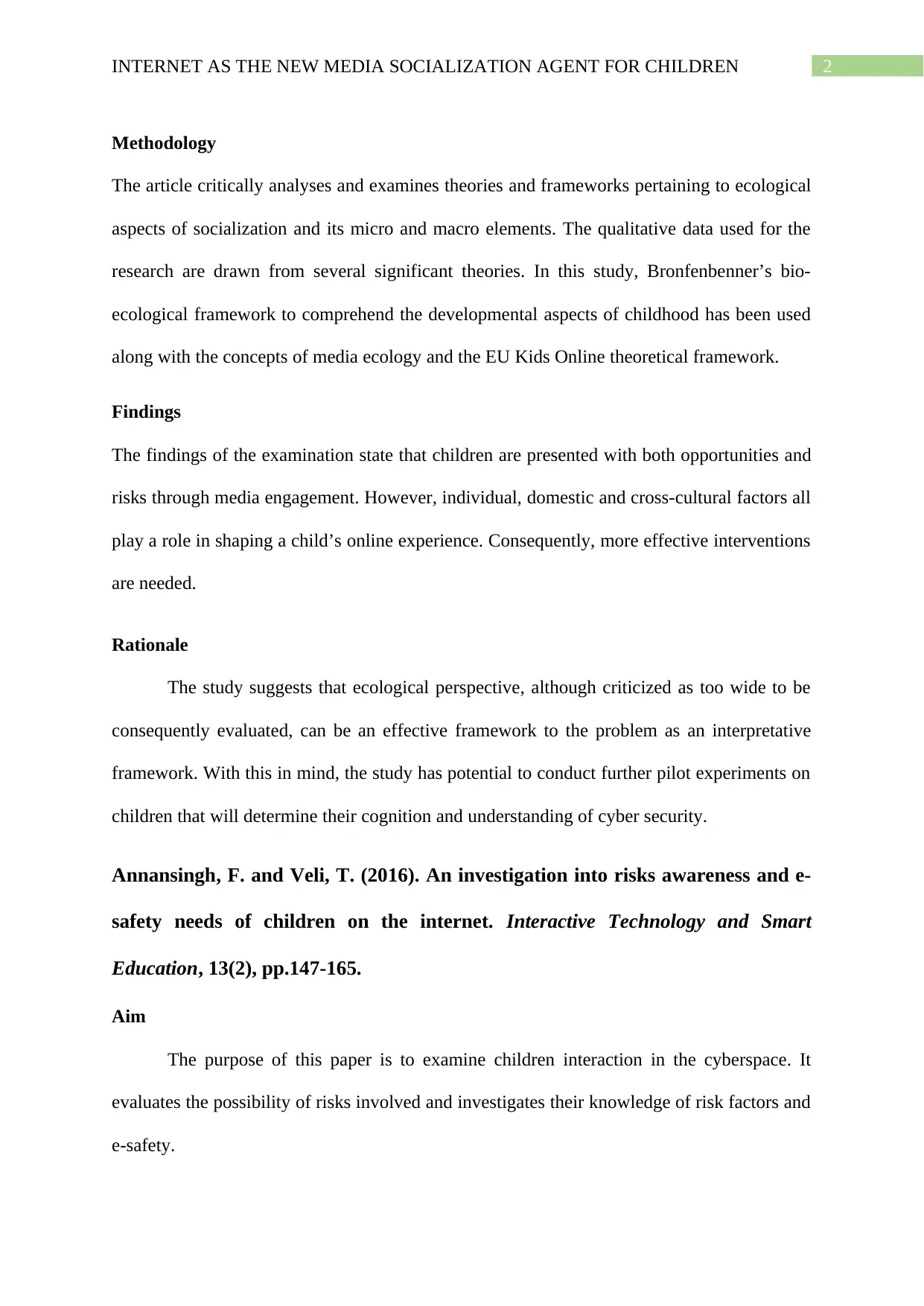
2INTERNET AS THE NEW MEDIA SOCIALIZATION AGENT FOR CHILDREN
Methodology
The article critically analyses and examines theories and frameworks pertaining to ecological
aspects of socialization and its micro and macro elements. The qualitative data used for the
research are drawn from several significant theories. In this study, Bronfenbenner’s bio-
ecological framework to comprehend the developmental aspects of childhood has been used
along with the concepts of media ecology and the EU Kids Online theoretical framework.
Findings
The findings of the examination state that children are presented with both opportunities and
risks through media engagement. However, individual, domestic and cross-cultural factors all
play a role in shaping a child’s online experience. Consequently, more effective interventions
are needed.
Rationale
The study suggests that ecological perspective, although criticized as too wide to be
consequently evaluated, can be an effective framework to the problem as an interpretative
framework. With this in mind, the study has potential to conduct further pilot experiments on
children that will determine their cognition and understanding of cyber security.
Annansingh, F. and Veli, T. (2016). An investigation into risks awareness and e-
safety needs of children on the internet. Interactive Technology and Smart
Education, 13(2), pp.147-165.
Aim
The purpose of this paper is to examine children interaction in the cyberspace. It
evaluates the possibility of risks involved and investigates their knowledge of risk factors and
e-safety.
Methodology
The article critically analyses and examines theories and frameworks pertaining to ecological
aspects of socialization and its micro and macro elements. The qualitative data used for the
research are drawn from several significant theories. In this study, Bronfenbenner’s bio-
ecological framework to comprehend the developmental aspects of childhood has been used
along with the concepts of media ecology and the EU Kids Online theoretical framework.
Findings
The findings of the examination state that children are presented with both opportunities and
risks through media engagement. However, individual, domestic and cross-cultural factors all
play a role in shaping a child’s online experience. Consequently, more effective interventions
are needed.
Rationale
The study suggests that ecological perspective, although criticized as too wide to be
consequently evaluated, can be an effective framework to the problem as an interpretative
framework. With this in mind, the study has potential to conduct further pilot experiments on
children that will determine their cognition and understanding of cyber security.
Annansingh, F. and Veli, T. (2016). An investigation into risks awareness and e-
safety needs of children on the internet. Interactive Technology and Smart
Education, 13(2), pp.147-165.
Aim
The purpose of this paper is to examine children interaction in the cyberspace. It
evaluates the possibility of risks involved and investigates their knowledge of risk factors and
e-safety.
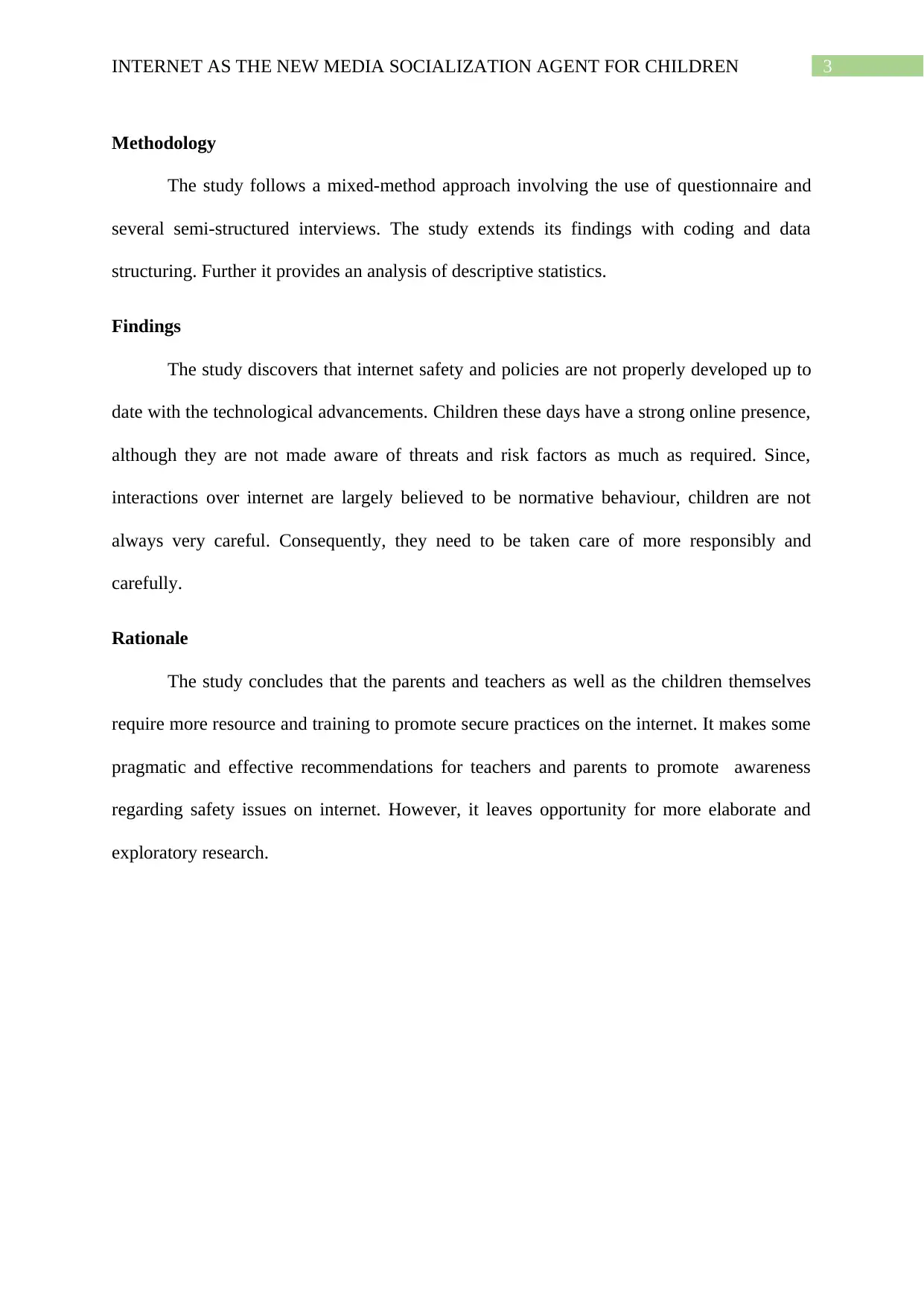
3INTERNET AS THE NEW MEDIA SOCIALIZATION AGENT FOR CHILDREN
Methodology
The study follows a mixed-method approach involving the use of questionnaire and
several semi-structured interviews. The study extends its findings with coding and data
structuring. Further it provides an analysis of descriptive statistics.
Findings
The study discovers that internet safety and policies are not properly developed up to
date with the technological advancements. Children these days have a strong online presence,
although they are not made aware of threats and risk factors as much as required. Since,
interactions over internet are largely believed to be normative behaviour, children are not
always very careful. Consequently, they need to be taken care of more responsibly and
carefully.
Rationale
The study concludes that the parents and teachers as well as the children themselves
require more resource and training to promote secure practices on the internet. It makes some
pragmatic and effective recommendations for teachers and parents to promote awareness
regarding safety issues on internet. However, it leaves opportunity for more elaborate and
exploratory research.
Methodology
The study follows a mixed-method approach involving the use of questionnaire and
several semi-structured interviews. The study extends its findings with coding and data
structuring. Further it provides an analysis of descriptive statistics.
Findings
The study discovers that internet safety and policies are not properly developed up to
date with the technological advancements. Children these days have a strong online presence,
although they are not made aware of threats and risk factors as much as required. Since,
interactions over internet are largely believed to be normative behaviour, children are not
always very careful. Consequently, they need to be taken care of more responsibly and
carefully.
Rationale
The study concludes that the parents and teachers as well as the children themselves
require more resource and training to promote secure practices on the internet. It makes some
pragmatic and effective recommendations for teachers and parents to promote awareness
regarding safety issues on internet. However, it leaves opportunity for more elaborate and
exploratory research.
Secure Best Marks with AI Grader
Need help grading? Try our AI Grader for instant feedback on your assignments.
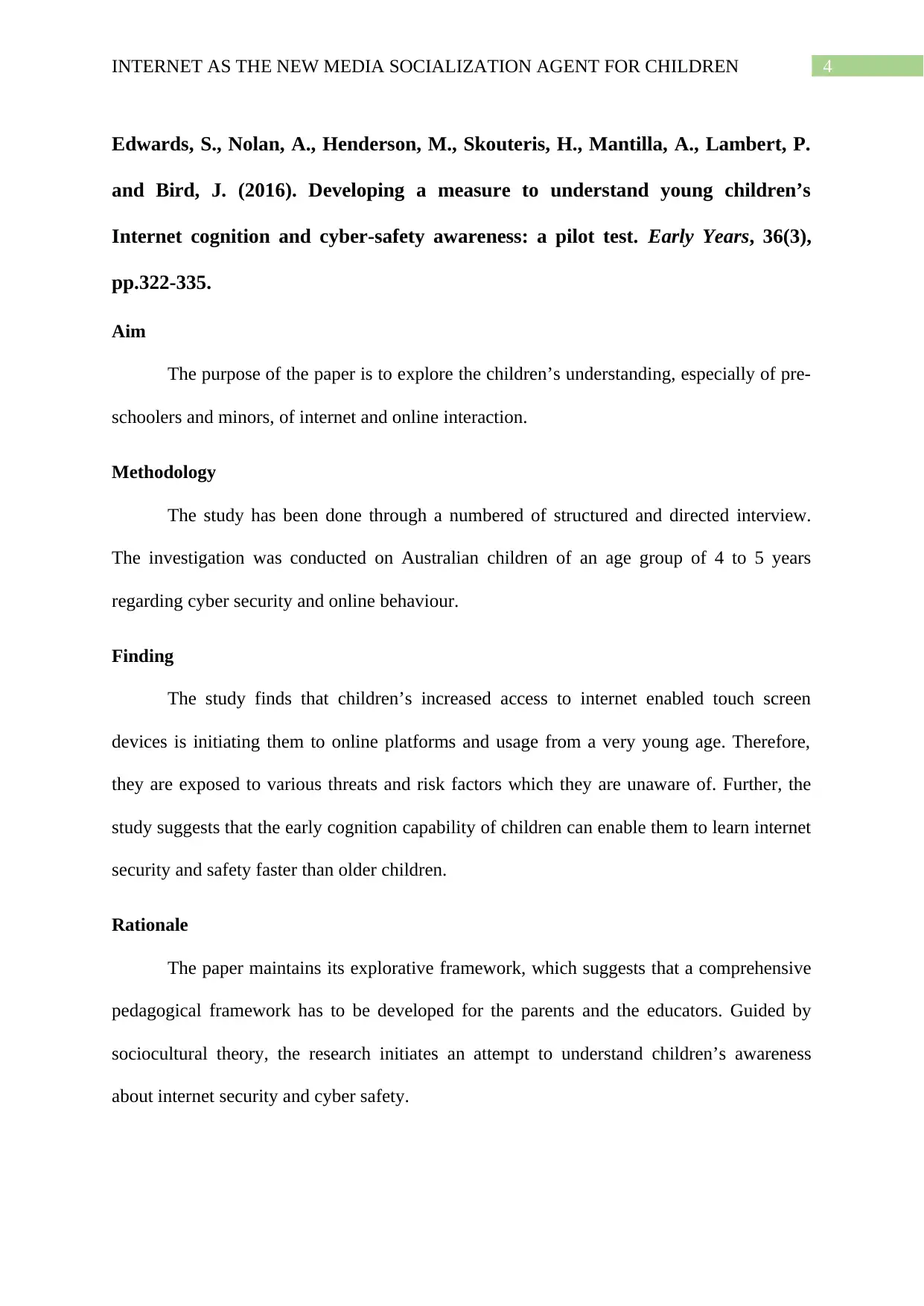
4INTERNET AS THE NEW MEDIA SOCIALIZATION AGENT FOR CHILDREN
Edwards, S., Nolan, A., Henderson, M., Skouteris, H., Mantilla, A., Lambert, P.
and Bird, J. (2016). Developing a measure to understand young children’s
Internet cognition and cyber-safety awareness: a pilot test. Early Years, 36(3),
pp.322-335.
Aim
The purpose of the paper is to explore the children’s understanding, especially of pre-
schoolers and minors, of internet and online interaction.
Methodology
The study has been done through a numbered of structured and directed interview.
The investigation was conducted on Australian children of an age group of 4 to 5 years
regarding cyber security and online behaviour.
Finding
The study finds that children’s increased access to internet enabled touch screen
devices is initiating them to online platforms and usage from a very young age. Therefore,
they are exposed to various threats and risk factors which they are unaware of. Further, the
study suggests that the early cognition capability of children can enable them to learn internet
security and safety faster than older children.
Rationale
The paper maintains its explorative framework, which suggests that a comprehensive
pedagogical framework has to be developed for the parents and the educators. Guided by
sociocultural theory, the research initiates an attempt to understand children’s awareness
about internet security and cyber safety.
Edwards, S., Nolan, A., Henderson, M., Skouteris, H., Mantilla, A., Lambert, P.
and Bird, J. (2016). Developing a measure to understand young children’s
Internet cognition and cyber-safety awareness: a pilot test. Early Years, 36(3),
pp.322-335.
Aim
The purpose of the paper is to explore the children’s understanding, especially of pre-
schoolers and minors, of internet and online interaction.
Methodology
The study has been done through a numbered of structured and directed interview.
The investigation was conducted on Australian children of an age group of 4 to 5 years
regarding cyber security and online behaviour.
Finding
The study finds that children’s increased access to internet enabled touch screen
devices is initiating them to online platforms and usage from a very young age. Therefore,
they are exposed to various threats and risk factors which they are unaware of. Further, the
study suggests that the early cognition capability of children can enable them to learn internet
security and safety faster than older children.
Rationale
The paper maintains its explorative framework, which suggests that a comprehensive
pedagogical framework has to be developed for the parents and the educators. Guided by
sociocultural theory, the research initiates an attempt to understand children’s awareness
about internet security and cyber safety.
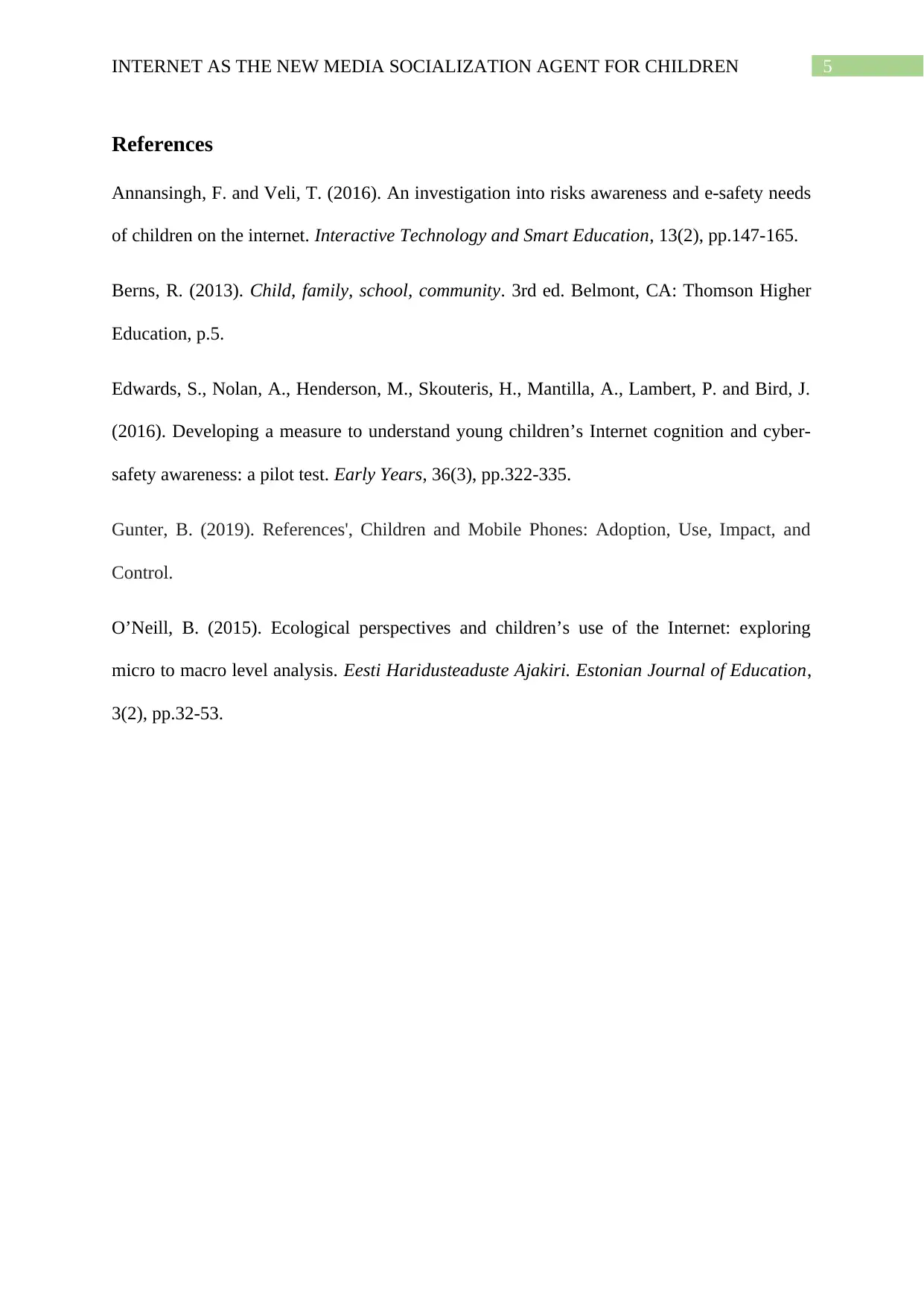
5INTERNET AS THE NEW MEDIA SOCIALIZATION AGENT FOR CHILDREN
References
Annansingh, F. and Veli, T. (2016). An investigation into risks awareness and e-safety needs
of children on the internet. Interactive Technology and Smart Education, 13(2), pp.147-165.
Berns, R. (2013). Child, family, school, community. 3rd ed. Belmont, CA: Thomson Higher
Education, p.5.
Edwards, S., Nolan, A., Henderson, M., Skouteris, H., Mantilla, A., Lambert, P. and Bird, J.
(2016). Developing a measure to understand young children’s Internet cognition and cyber-
safety awareness: a pilot test. Early Years, 36(3), pp.322-335.
Gunter, B. (2019). References', Children and Mobile Phones: Adoption, Use, Impact, and
Control.
O’Neill, B. (2015). Ecological perspectives and children’s use of the Internet: exploring
micro to macro level analysis. Eesti Haridusteaduste Ajakiri. Estonian Journal of Education,
3(2), pp.32-53.
References
Annansingh, F. and Veli, T. (2016). An investigation into risks awareness and e-safety needs
of children on the internet. Interactive Technology and Smart Education, 13(2), pp.147-165.
Berns, R. (2013). Child, family, school, community. 3rd ed. Belmont, CA: Thomson Higher
Education, p.5.
Edwards, S., Nolan, A., Henderson, M., Skouteris, H., Mantilla, A., Lambert, P. and Bird, J.
(2016). Developing a measure to understand young children’s Internet cognition and cyber-
safety awareness: a pilot test. Early Years, 36(3), pp.322-335.
Gunter, B. (2019). References', Children and Mobile Phones: Adoption, Use, Impact, and
Control.
O’Neill, B. (2015). Ecological perspectives and children’s use of the Internet: exploring
micro to macro level analysis. Eesti Haridusteaduste Ajakiri. Estonian Journal of Education,
3(2), pp.32-53.
1 out of 6
Related Documents
Your All-in-One AI-Powered Toolkit for Academic Success.
+13062052269
info@desklib.com
Available 24*7 on WhatsApp / Email
![[object Object]](/_next/static/media/star-bottom.7253800d.svg)
Unlock your academic potential
© 2024 | Zucol Services PVT LTD | All rights reserved.




